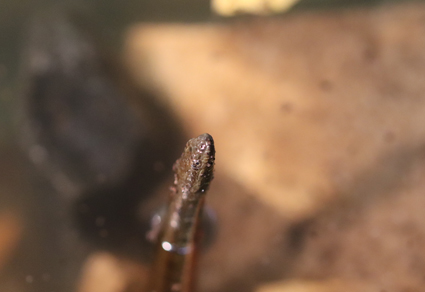Abstract
We report data on morphological variation and behavior of the recently described watersnake Helicops boitata, previously known strictly from the holotype. Our data come from five new specimens fortuitously found in a private area near the type locality, in the Brazilian Pantanal wetlands. The expanded sample revealed polymorphism in at least two scalation features previously assumed as diagnostic of the species (i.e., undivided condition of the cloacal plate and nasal scales) and confirmed the uniqueness of the ventral color pattern, as well as the divided condition of the foremost ventral shields. In addition, three individuals collected alive also exhibited the same harmless behavior reported to the holotype, a rather unusual feature among snakes of the genus Helicops. Other new behavioral observations include mostly nocturnal activity (in contrast with the previous data) and the ability to dig galleries in the soft substrate when attempting to escape. The finding of five individuals very close to each other suggest aggregations in habitats prone to retain humidity in the dry season of the Pantanal. Low abundance rates and possible habitat restrictions might render Helicops boitata particularly susceptible to seasonal fire episodes that consume large extensions of the wetlands, including temporarily dry flooding fields in which aquatic reptiles find refuge during the seasonal droughts.
References
- Assine, M.L., Macedo, H.A., Stevaux, J.C., Bergier, I., Padovani, C.R. & Silva, A. (2016) Avulsive rivers in the hydrology of the Pantanal wetland. In: Bergier, I. & Assine, M. (Eds.), Dynamics of the Pantanal Wetland in South America. The Handbook of Environmental Chemistry. Vol. 37. Springer, Cham, pp. 83–110. https://doi.org/10.1007/698_2015_351
- Ferreira, V.L., Terra, J.D.S., Piatti, L., Delatorre, M., Strüssmann, C., Béda, A.F., Kawashita-Ribeiro, R.A., Landgref-Filho, P., Aoki, C., Campos, Z., Souza, F.L., Ávila, R.W., Duleba, S., Martins, K.S., Rita, P.H.S. & Albuquerque, N.R. (2017) Répteis do Mato Grosso do Sul. Brazil. Iheringia, Serie Zoologia, 107 (Supplement), e2017153. https://doi.org/10.1590/1678-4766e2017153
- Gaston, K.J., Blackburn, T.M. & Loder, N. (1995) Which species are described first?: the case of North American butterflies. Biodiversity & Conservation, 4, 119–127. https://doi.org/10.1007/BF00137780
- Junk, W.J., Nunes-da-Cunha, C., Wantzen, K.M., Petermann, P., Strüssmann, C., Marques, M.I. & Adis, J. (2006) Biodiversity and its conservation in the Pantanal of Mato Grosso, Brazil. Aquatic Sciences, 68, 278–309. https://doi.org/10.1007/s00027-006-0851-4
- Marques, O.A.V., Eterovic, A., Strüssmann, C. & Sazima, I. (2005) Serpentes do Pantanal: Guia Ilustrado. Holos Editora, Ribeirão Preto, 184 pp.
- Moraes-da-Silva, A., Amaro, R.C., Nunes, P.M.S., Rodrigues, M.T. & Curcio, F.F. (2021) Long known, brand new, and possibly threatened: a new species of watersnake of the genus Helicops Wagler, 1828 (Serpentes; Xenodontinae) from the Tocantins-Araguaia River Basin, Brazil. Zootaxa, 4903 (2), 217–241. https://doi.org/10.11646/zootaxa.4903.2.3
- Moraes-da-Silva, A., Amaro, R.C., Nunes, P.M.S., Strüssmann, C., Teixeira Jr., M., Andrade Jr., A., Sudré, V., Recoder, R., Rodrigues, M.T. & Curcio, F.F. (2019) Chance, luck and a fortunate finding: a new species of watersnake of the genus Helicops Wagler, 1828 (Serpentes: Xenodontinae), from the Brazilian Pantanal wetlands. Zootaxa, 4651 (3), 445–470. https://doi.org/10.11646/zootaxa.4651.3.3
- Sabaj, M.H. (2020) Codes for natural history collections in ichthyology and herpetology. Copeia, 108, 593–669. https://doi.org/10.1643/ASIHCODONS2020
- Strüssmann, C. & Sazima, I. (1993) The snake assemblage of the Pantanal at Poconé, western Brazil: faunal composition and ecological summary. Studies on Neotropical Fauna and Environment, 28 (3), 157 –168. https://doi.org/10.1080/01650529309360900
- Strüssmann, C., Ribeiro, R.A.K. Ferreira, V.L. & Béda, A.F. (2007) Herpetofauna do Pantanal Brasileiro. In: Nascimento, L.B. & Oliveira, M.E (Eds.), Herpetologia no Brasil II. Sociedade Brasileira de Herpetologia, Belo Horizonte, pp. 66–84.
- Strüssmann, C., Prado, C.P.A., Ferreira, V.L. & Kawashita-Ribeiro, R.A. (2010) Diversity, ecology, management and conservation of amphibians and reptiles of the Brazilian Pantanal: a review. In: Junk, W.J., Da Silva, C.J., Cunha, C.N. & Wantzen, K.M. (Org.), The Pantanal. Ecology, Biodiversity and Sustainable Management of a large Neotropical Seasonal Wetland. Pensoft, Sophia, pp. 497–522.
- Tomas, W.M., Berlinck, C.N., Chiaravalloti, R.M., Faggioni, G.P., Strüssmann, C., Libonati, R., Abrahão, C.R., Alvarenga, G.V., Bacellar, A.E.F., Batista, F.R.Q., Bornato, T.S., Camilo, A.R., Castedo, J., Fernando, A.M.E., Freitas, G.O., Garcia, C.M., Gonçalves, H.S., Guilherme, M.B.F., Layme, V.M.G., Lustosa, A.P.G., Oliveira, A,C., Oliveira, M.R., Pereira, A.M.M., Rodrigues, J.A., Semedo, T.B.F., Souza, R.A.D., Tortato, F.R., Viana, D.F.P., Vicente-Silva, L. & Morato, R. (2021) Distance sampling surveys reveal 17 million vertebrates directly killed by the 2020’s wildfires in the Pantanal, Brazil. Scientific Reports, 11 (1), 1–8. https://doi.org/10.1038/s41598-021-02844-5
- Tomas, W.M., de Oliveira Roque, F., Morato, R.G., Medici, P.E., Chiaravalloti, R.M., Tortato, F.R., Penha, J.M., Izzo, T.J., Garcia, L.C., Lourival, R.F. & Girard, P. (2019) Sustainability agenda for the Pantanal Wetland: perspectives on a collaborative interface for science, policy, and decision-making. Tropical Conservation Science, 12, 1940082919872634. https://doi.org/10.1177/1940082919872634


